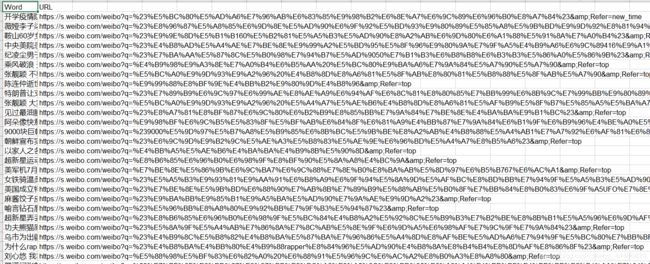Python爬虫抓取微博热搜榜
环境
Python 3.7.4
bs4==0.0.1
xlwt==1.3.0
urllib3==1.24.2
re
初始化
def __init__(self):
self.hotSearchPattern = re.compile(r'(.*?)')
self.advertisementPattern = re.compile(r'(.*?)')
self.url = 'https://s.weibo.com/top/summary'
self.prefixUrl = 'https://s.weibo.com'
self.headers = {
"User-Agent" : "Mozilla/5.0 (Windows NT 10.0; Win64; x64) AppleWebKit/537.36 (KHTML, like Gecko) Chrome/83.0.4103.61 Safari/537.36"}
抓取网页
def crawlPage(self, url):
request = urllib.request.Request(headers = self.headers, url = url)
page = None
try:
response = urllib.request.urlopen(request)
page = response.read().decode('utf-8')
except urllib.error.URLError as e:
print("Get page fail!")
print(e)
return page
提取数据
def extractData(self):
page = self.crawlPage(self.url)
beautifulSoup = BeautifulSoup(page, 'html.parser')
hotSearchList = []
for tag in beautifulSoup.find_all('td', class_ = 'td-02'):
tag = str(tag)
item = re.findall(self.hotSearchPattern, tag)
if len(item) == 0:
item = re.findall(self.advertisementPattern, tag)
hotSearchList.append([item[0][1], self.prefixUrl + item[0][0]])
return hotSearchList
导出为XLS文件
class Exporter():
def __init__(self):
self.workbook = xlwt.Workbook(encoding='utf-8')
def exportXLS(self, columns, data, path, sheetName):
if len(data) == 0:
print("Please get data first!")
return
sheet = self.workbook.add_sheet(sheetName)
for column in range(0, len(columns)):
sheet.write(0, column, columns[column])
for i in range(1, len(data) + 1):
for column in range(0, len(columns)):
sheet.write(i, column, data[i - 1][column])
self.workbook.save(path)
实现代码
import re
from bs4 import BeautifulSoup
import urllib
import xlwt
class Spider():
'''
Description:
Spider program to crawl data from Weibo hot search rank list
Attributes:
None
'''
def __init__(self):
self.hotSearchPattern = re.compile(r'(.*?)')
self.advertisementPattern = re.compile(r'(.*?)')
self.url = 'https://s.weibo.com/top/summary'
self.prefixUrl = 'https://s.weibo.com'
self.headers = {
"User-Agent" : "Mozilla/5.0 (Windows NT 10.0; Win64; x64) AppleWebKit/537.36 (KHTML, like Gecko) Chrome/83.0.4103.61 Safari/537.36"}
'''
Description:
crawl page from the given URL
Args:
url: the URL of page need to get
Returns:
page of the given URL
'''
def crawlPage(self, url):
request = urllib.request.Request(headers = self.headers, url = url)
page = None
try:
response = urllib.request.urlopen(request)
page = response.read().decode('utf-8')
except urllib.error.URLError as e:
print("Get page fail!")
print(e)
return page
'''
Description:
extract data from the given page, return the list of data
Args:
None
Returns:
list of data extract from given page
'''
def extractData(self):
page = self.crawlPage(self.url)
beautifulSoup = BeautifulSoup(page, 'html.parser')
hotSearchList = []
for tag in beautifulSoup.find_all('td', class_ = 'td-02'):
tag = str(tag)
item = re.findall(self.hotSearchPattern, tag)
if len(item) == 0:
item = re.findall(self.advertisementPattern, tag)
hotSearchList.append([item[0][1], self.prefixUrl + item[0][0]])
return hotSearchList
class Exporter():
'''
Description:
export the dictionary and list to xls file
Attributes:
None
'''
def __init__(self):
self.workbook = xlwt.Workbook(encoding='utf-8')
'''
Description:
export the dictionary and list to xls file
Args:
columns: the labels of each c0lumn
data: the list of data
path: the path to save xls file
sheetName: the name of sheet created in the xls file
Returns:
None
'''
def exportXLS(self, columns, data, path, sheetName):
if len(data) == 0:
print("Please get data first!")
return
sheet = self.workbook.add_sheet(sheetName)
for column in range(0, len(columns)):
sheet.write(0, column, columns[column])
for i in range(1, len(data) + 1):
for column in range(0, len(columns)):
sheet.write(i, column, data[i - 1][column])
self.workbook.save(path)
if __name__ == "__main__":
spider = Spider()
hotSearchList = spider.extractData()
for hotSearch in hotSearchList:
print("%s %s" % (hotSearch[0], hotSearch[1]))
columns = ['Word', 'URL']
sheetName = 'HotSearch'
path = './HotSearch.xls'
exporter = Exporter()
exporter.exportXLS(columns, hotSearchList, path, sheetName)
输出结果
XLS文件结果

最后
- 由于博主水平有限,不免有疏漏之处,欢迎读者随时批评指正,以免造成不必要的误解!
